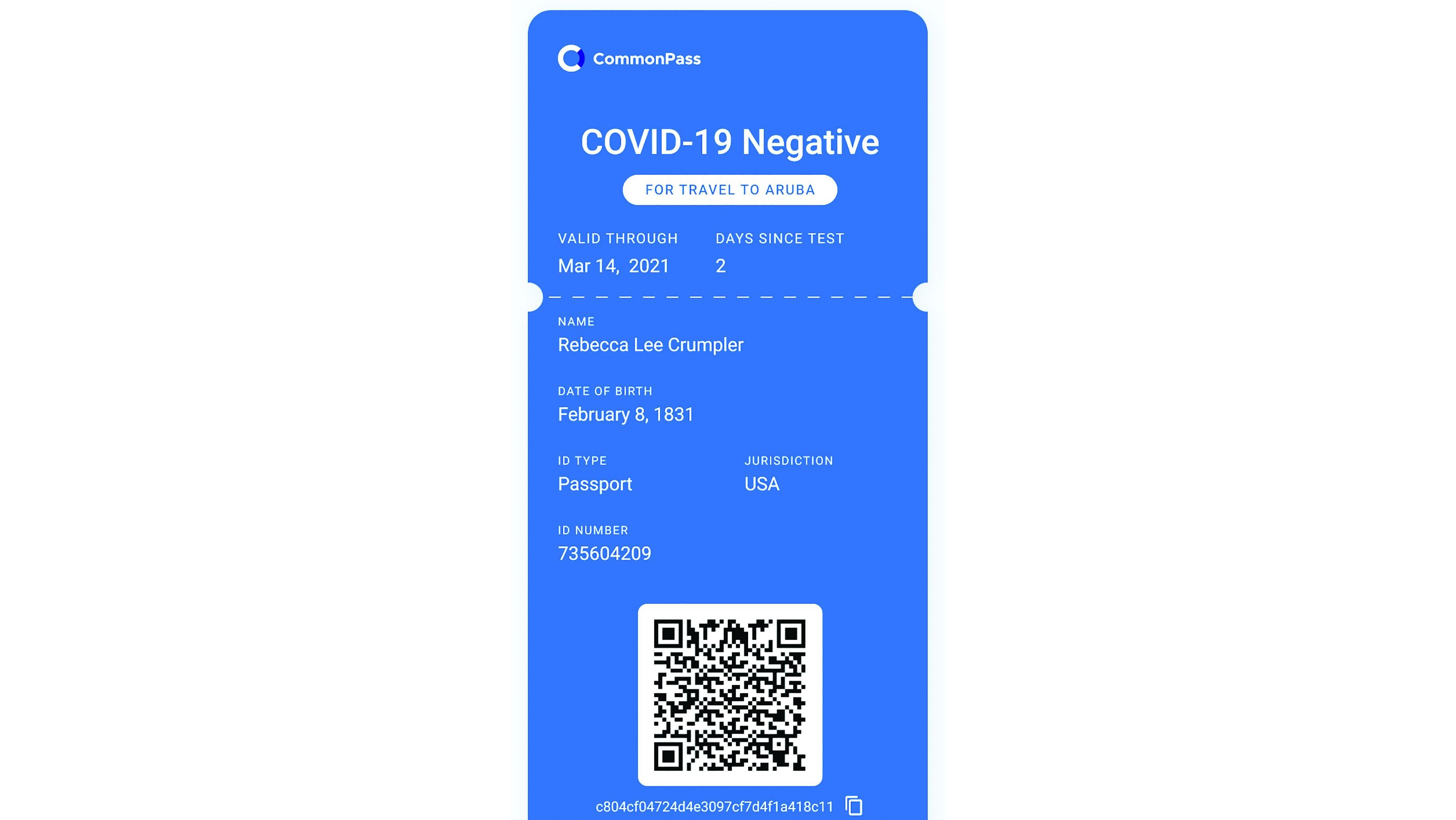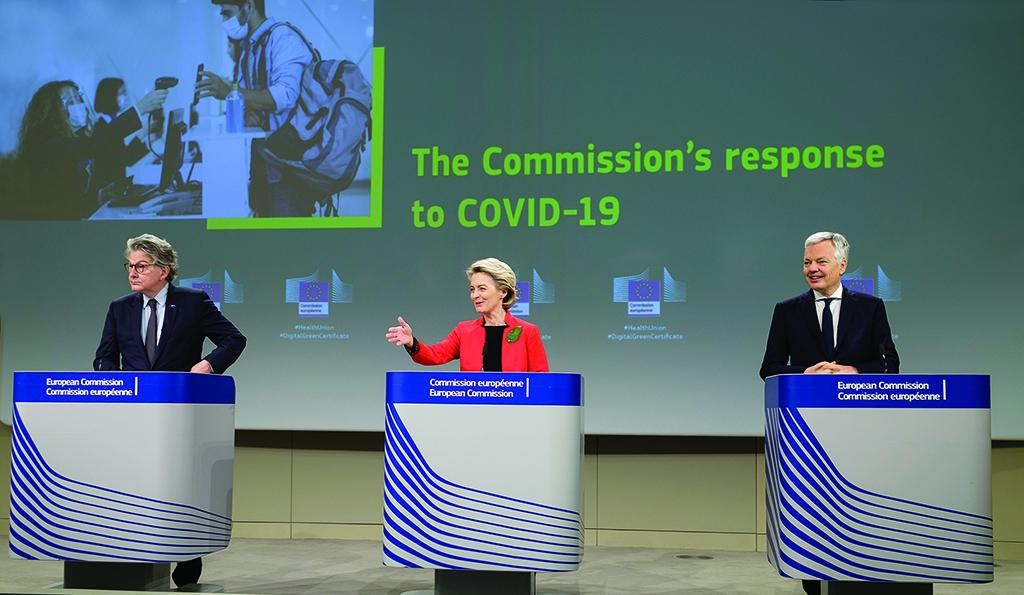Digital Passports Could Be Key To International Travel Recovery | 国際線回復に向け、大きな役割を担うデジタルパスポート

世界規模で新型コロナウィルスのワクチン接種が進む中で、デジタルワクチンパスポートなど、海外旅行客のワクチン接種をどのような形で証明するのが最も効率的なのか、各国政府や航空会社は検討を進めている。
ヨーロッパの航空会社は、通常の春期シーズンの何分の1かの運航を続ける中で、デジタルグリーン証明書(新型コロナウィルス陰性/抗体保持/ワクチン接種の証明)の発行を望んでおり、これが旅行者の安心感を高め、夏休みのフライトを予約する利用者にとっても利便性を高めることにつながると考えている。
欧州委員会が発行するデジタルグリーン証明書は、セキュリティと信頼性を担保するためにQRコードが用いられ、デジタル形式または書類を選択でき、発行は無料だ。このデジタル証明書はEU圏内の旅行者が、新型コロナウィルスに感染後回復/ワクチン接種済み/検査陰性であることを証明できるようになる。
計画の発表にあたり欧州委員会は、プライバシーの保護・移動の自由・データのセキュリティについて市民の安心感を得るため、この証明はEUの全加盟国で有効であり、EU圏内で旅行するための必須条件ではないことを明らかにした。
委員会は、それぞれの証明書発行機関(病院・検査施設・保健機関など)に割り当てられたデジタル署名の暗号鍵を検証するゲートウェイの構築を計画しているため、証明書に含まれる個人データを国が保持することはできない。つまり、個人データそのものはゲートウェイを通過できないということだ。
委員会としては、デジタルグリーン証明書の発行に向けた技術的作業と各国への提案を数ヶ月以内に完了させることを目指している。ただし、これが順調に推移し、夏休み前にデジタルパスポートが準備できたとしても、多くの国で感染者数が増加し、規制が強化されている中では、確実な旅行者数の回復には程遠い。

IATAやAirlines for Europe(A4E)といった業界団体はデジタルグリーン証明書の発行を歓迎しているが、渡航制限の緩和・解除の条件や基準と、予想される時期の発表、検査実施基準の統一に向けた取り組みを始めるよう、EUに要望している。
航空会社や空港としては、昨年のような、旅行に関する制限や要件が夏休みの直前になって変更され、帰国時に予想外の隔離を強いられる不安から旅行者が予約を躊躇し、旅行需要回復の兆しが突如消滅する…といった事態の再来を避けたいと考えている。
IATAは以前から、旅行者の健康情報がデジタル形式で用意されることが国際線を再開させるための必須条件としており、これは運用面から国際線の回復を持続させるためのものだ。
また、IATAは検査結果やワクチン接種情報を保管する、独自のモバイルアプリ「IATA Travel Pass」を開発した。また、エールフランス、ブリティッシュ・エアウェイズ、ライアンエアーなども、独自に健康データ保管アプリを開発している。
シンガポール航空は、アジア太平洋地域で最初にIATA Travel Passの検証を始めた航空会社のひとつだ。他にも、ニュージーランド航空、ANA、大韓航空、カンタス航空、タイ航空、Thai VietJetなども検証を開始または利用に合意している。
ANAやカンタス航空などは、IATAのシステムに加えてCommonPassの利用も検証している。キャセイパシフィック航空はCommonPassの運用試験を行った。
カンタス航空は、将来的にはこういったシステムを自社アプリに統合したい意向を示している。同社CEOのAlan Joyce氏は以前、ワクチン接種が広く実施されるようになった際には、国際線利用者に対しワクチン接種証明を要求することになるだろうと述べている。また、オーストラリア政府は国の「Medicare」および「MyGov」アプリを通じて、ワクチン接種証明の発行と表示が可能になると発表した。
マレーシア航空は、独自に「Digital Travel Health Pass」の開発を計画しており、IATA Travel Passから「一部のモジュールを取り込む」としている。同社の独自アプリにIATAのモジュールが取り込まれることについて、IATAの空港・旅客・貨物・セキュリティ担当上級副社長を務めるNick Careen氏は「IATA Travel Passにとってこれは重要なマイルストーンになる。この連携はIATAアプリの相互運用性を示すもので、世界規模で普及を進める上で重要なことだ」と述べている。
CommonPassアプリは現在のところワクチン接種証明の保管まではできないが、プロジェクトチームは近いうちに実現させる計画を示している。
アメリカでは、政府としてワクチンパスポートの開発支援は行わないとバイデン政権は発表している。3月29日、アメリカ保健福祉省の機関である Centers for Medicare and Medicaid Servicesの長官代理・ Andy Slavitt氏は報道陣に対し「デジタルパスポートの開発は政府の役割ではなく(中略)、民間で行われるべきだと考えている」と述べた。
アメリカの航空会社は今のところ搭乗時にワクチン接種証明を求めてはいないが、いくつかのデジタル健康情報プロバイダーと協力し、特定の地域に向けた搭乗手続の迅速化を進めており、いずれその中にワクチン接種証明を取り込む余地も残している。
たとえば、ジェットブルー航空のボストン〜アルバ便ではCommonPassアプリを使って陰性証明を提示できるようにしており、ユナイテッド航空のニューアーク〜ロンドン便では同アプリを用いて健康記録をアップロードできるようになっている。
また、Clear社が開発したHealth Passアプリでは、デルタ航空およびユナイテッド航空のハワイ〜アメリカ西海岸路線の利用者と健康情報をひも付けている。アプリ利用者はハワイ到着時に専用のリストバンドを受け取り、手続の時間を短縮することができる。同社は、近いうちにワクチン接種情報の検証も始めるとしている。
一方、アメリカン航空は、アメリカに到着する国際線利用者に対して自社のVeriFLYアプリを用い、検査結果に関する健康記録や、その他の渡航に必要な要件を満たすための機能を提供している。
アメリカ航空協会、国際空港評議会の北米事務所、IATAなどを含む数十の航空関連団体の連合体は、3月22日付の書簡でバイデン政権に対し、新型コロナウィルスに関する健康証明書の「統一原則」を策定するよう要請した。
この書簡は、ホワイトハウスの新型コロナウィルス担当調整官・Jeffrey Zients氏に宛てられたもので、「CDC(アメリカ疾病予防管理センター)は、検査結果とワクチン接種履歴の両方を安全に検証し、個人情報を保護し、適用されるプライバシー関連法を遵守し、地域・州・国際的な管轄権を超えて運用できる、広範な(認証)技術の提供に向けた、世界的なリーダーシップを取るべきだ」と記載されている。
Capital Alpha社のアナリスト・Rob Smith氏は自身の研究ノートの中で、バイデン政権がアメリカの全ての成人に対し5月中にワクチン接種を実現できる供給量を確保するという計画を立てたことで、「デジタルワクチンパスポートに対する政策や業界の注目度が高まるはずだ」と書いている。しかし、そこには法律や規制面でのハードルが残っていると彼は認識しており、これらが新しい医療技術のタイムリーな導入の妨げになる可能性があると指摘している。
「航空会社や雇用者などが、特定のアプリの使用をどのように要求するかはまだ不透明で、ワクチン接種証明をどのような状況であれば要求できるのかについても、多くの法的問題が予想される」と同氏は書いている。
As vaccination drives gather steam across the globe, airlines and governments are scrambling to determine how best to prove inoculation of international travelers, including through the use of digital health passports.
In Europe, carriers operating at a fraction of their normal spring levels are hoping plans for a digital green certificate—a document that will provide proof of a negative COVID-19 test, antibodies or vaccination—will boost confidence and convince consumers to book summer vacations.
The European Commission’s Digital Green Certificate will be available for free in digital or paper format, including a QR code to ensure both security and authenticity. The digital certificate will allow travelers within the EU to demonstrate that they have either recovered from COVID-19, been vaccinated or tested negative.
Announcing the plan, the commission sought to reassure citizens about privacy, free movement and data security, noting that the certificate will be valid in all EU countries and will not be a precondition for travel within the EU.
Countries will not be able to retain personal data contained in the certificate, as the commission plans to build a gateway that will be able to verify the individual digital signature keys allocated to certificate-issuing bodies—such as hospitals, test centers or health authorities—meaning personal data itself does not pass through the gateway.
The commission says it aims to have the technical work on the digital green certificate and the proposal completed in the coming months. But even if that progresses smoothly and the passport is ready for the summer season, recovery is far from assured, due to rising infection numbers and tightening health restrictions in many countries.

Industry groups including Airlines for Europe and the Inter-national Air Transport Association (IATA) welcomed the digital green certificate but also called for work to begin on an EU road map setting out the conditions, criteria and possible timing for the easing and lifting of travel restrictions, as well as a harmonized implementation of testing policies.
Airlines and airports want to avoid a repeat of last summer, when a recovery was abruptly curtailed by last-minute changes to travel restrictions and requirements that saw consumers reluctant to book flights for fear of an unexpected quarantine requirement on returning home.
IATA has previously warned that health information about passengers must be available in digital form for a restart of international air travel, in order to make the recovery sustainable from an operational point of view.
The association has also put forward its own solution, the IATA Travel Pass, a mobile app that will store testing and vaccination data. Individual airlines including Air France, British Airways and Ryanair have also taken matters into their own hands with health-data apps.
Singapore Airlines was one of the Asia-Pacific leaders in testing the IATA Travel Pass. Several other carriers in the region are also trying out the IATA app or have agreed to do so, including: Air New Zealand, All Nippon Airways (ANA), Korean Air, Qantas, Thai Airways and Thai VietJet, among others.
Some carriers, such as ANA and Qantas, are assessing the CommonPass alternative in addition to the IATA system. Cathay Pacific has conducted trials with CommonPass.
Qantas says it intends to integrate such a system into its own app in the longer term. CEO Alan Joyce has previously said the airline will likely require international passengers to have proof of vaccinations when the vaccine becomes widely available. The Australian government has announced that vaccination certificates will be issued and made available through its Medicare and MyGov apps.
Malaysia Airlines plans to develop and release its Digital Travel Health Pass, which it says will “incorporate some modules” from the IATA Travel Pass. The carrier’s approach of integrating IATA elements into its own app “is an important milestone for the IATA Travel Pass,” says Nick Careen, IATA senior vice president for airports, passengers, cargo and security. The partnership “will demonstrate the [IATA] app’s interoperability, an important feature supporting its global uptake,” Careen says.
While the initiative so far has not been expanded for the use of vaccination records, the CommonPass project has indicated plans to allow customers to store such records on the app soon.
In the U.S., the Biden administration has said it does not support the creation of a federal program for vaccine passports. On March 29, Andy Slavitt, the acting administrator of the Centers for Medicare and Medicaid Services, told reporters: “The government is not viewing its role as the place to create a passport. . . . We view this as something the private sector should do.”
While U.S. carriers are not currently requiring proof of vaccination to fly, they are collaborating with certain providers of digital health credentials to expedite the boarding and clearance process on flights to certain destinations, while leaving the door open to expanding their digital offerings to include vaccine records eventually.
JetBlue Airways, for example, is using CommonPass as a means for passengers to display their negative COVID-19 test results on flights from Boston to Aruba, while United Airlines is allowing customers to upload health records using the CommonPass app on flights from Newark, New Jersey, to London.
Another initiative is Clear, which uses its Health Pass app to link travelers with their health records, including on routes operated by Delta Air Lines and United Airlines to Hawaii from the U.S. West Coast. Using the app, customers arriving in Hawaii can get a wristband at the airport that enables faster processing times. Clear has also said it will begin validating vaccine information soon.
American Airlines, meanwhile, is offering customers flying internationally to the U.S. the ability to upload their health records related to COVID-19 testing and to fulfill other travel requirements through its VeriFLY app.
A coalition of several dozen aviation groups—including Airlines for America, Airports Council International-North America and IATA—urged the Biden administration in a March 22 letter to develop “uniform principles” for COVID-19 health credentials.
“The [Centers for Disease Control and Prevention] should provide global leadership by ensuring the wide array of [credentialing] technologies can securely validate both test results and vaccination history, protect personal data, comply with applicable privacy laws, and operate across local, state and international jurisdictions,” the groups wrote in a letter addressed to White House COVID-19 Coordinator Jeffrey Zients.
Capital Alpha analyst Rob Smith wrote in a research note that the Biden administration’s plan to have enough supply to vaccinate all U.S. adults by the end of May should lead to “increased policy and industry focus on digital vaccine passports.” Still, he observed that outstanding legal and regulatory hurdles could potentially delay the timely implementation of new health technologies.
“It remains to be seen how and whether airlines, employers, and others will require use of certain apps, and we expect numerous legal challenges as to whether and under what circumstances they can require proof of vaccination,” Smith wrote.